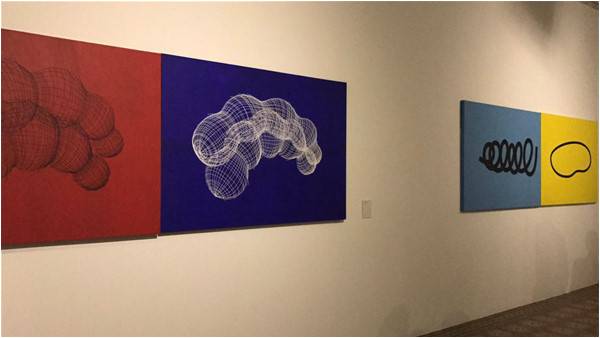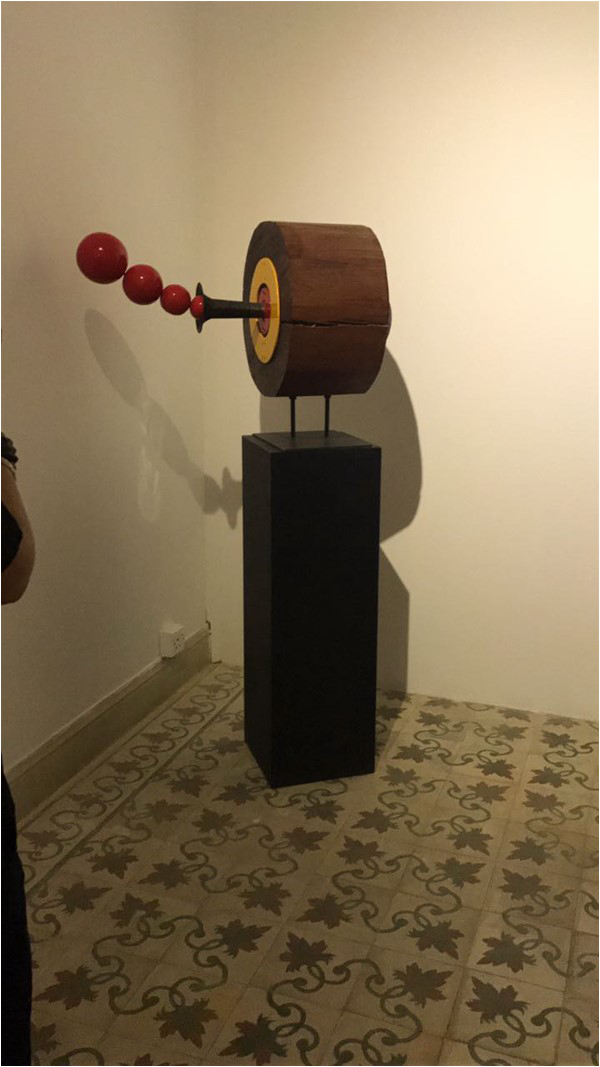
Alchemy is widely known as the forerunner of chemistry and is concerned with the transmutation of matter. In other words, its primary focus was to allow a new object to emerge from the one at hand. So when a retrospect of the works of the great Imran Mir is given the title, ‘Alchemist of Line’, it becomes clear that the show hints at amazing its audience with Mir’s ability to take traditional art materials and produce something new and exciting.
Imran Mir (1950-2014) was an artist based in Karachi whose practice – that included painting, sculpture and design – is still unparalleled today. After graduating from the Central Institute of Art and Design (CIAC) in 1971, he went on to study at the Ontario College of Art and Design, Toronto, which he said, “dramatically influenced my outlook on making art… and the realisation that it is not technique that matters in art but the concept.” It was not common at the time for Pakistani artists to study abroad and this exposure may have aided in the artist’s constant assimilation of ideas into his work. Mir divided his body of work into what he called, ‘Twelve Papers on Modern Art’, perhaps a way of explaining his process to his viewers or perhaps a way of understanding it himself.

It was interesting to see that instead of following the orientation of the Twelve Papers, curators NasreenAskari and Durriya Kazi divided the works in a way that spoke to them. The exhibition was divided into five rooms, each with their own title and understanding of the work.
‘Perfect Imperfect’ were titles for rooms 1 and 2 which looked at the perfection the artist achieved through his continuous experimentation with line and form. Instead of displaying the elements as they are, Mir’s work played with the aesthetic and it is through that chaos and absurdity that perfection was attained.
Moving to the third room that was titled ‘Kinetics’, the audience was allowed to witness the beauty of movement and energy felt through the paintings and sculptures. There is a clear sense of geometry in paintings. Mir looked at spatial concepts while experimenting with the simple elements of design: form, line and colour. There is also an intriguing play with the geometric and organic, where the artist painstakingly produced accurately linear art while still keeping the aesthetic fresh with a an organic form surprising the canvas.

There is a noticeable connection that the artist held with primary colours and shapes as they adorned multiple pieces that were placed in room 4. Aptly labelled ‘Reality and Illusion’ this gallery displayed Mir’s most colorful artworks. The works were a combination of pyramid, cones and cylindrical forms that were again dissected and recomposed to produce visually defining work. He played around with perspective, light and shade in a way that grounded his subject matter but at the same time placed them in a space of non-reality.
His last room, ‘Tracing the Line’ took on a more somber appearance in comparison. The paintings here were more focused on the investigation of a line, how its movement and lack thereof would guide the eye and tell it when to stop. The line develops its own sense of three dimensionality and fill the spaces of the canvas with control and seriousness.

As a designer, Mir created illustrations for some of the biggest names in Pakistan today – and even through his design he managed to bring his sensibility, that he used through his art. The blurbs he created for various brands were presented with satire that was not present in the earlier traditional works.
Mir’s work is laudable for his incredible precision and painstaking process. His absolutely clean-cut line work is unbelievable especially at a time when technology was not as advanced as it is today. Throughout his oeuvre there is a certain wit that exhumes which, in a way, is ubiquitous to the artist. As one stands in front of work, there will be a constant need to interpret and reinterpret, dissect and discuss what the artist may have been thinking or what the work may be saying. In reality we may never know. The work is what it is – a painting or a sculpture. The line is just a line trying to figure its way around the boundary of the canvas, stopping when the artist decided. The sphere on the floor dictate energy in their placement and sit proudly in their absurdity and this is one of the most amazing things about Mir. He chose to let the work speak. He allowed it to be skin deep – what you see is what you get.
Imran Mir will always be considered as one of Karachi’s front-runners in the field of art and design. His work has been widely applauded for its ability to house the binary of simplicity and complexity on one surface while still managing to achieve the aesthetics of minimalism. His passing was greatly felt throughout the Pakistani art circle.
The show continues till October 20th, 2018.
Imran Mir (1950-2014) was an artist based in Karachi whose practice – that included painting, sculpture and design – is still unparalleled today. After graduating from the Central Institute of Art and Design (CIAC) in 1971, he went on to study at the Ontario College of Art and Design, Toronto, which he said, “dramatically influenced my outlook on making art… and the realisation that it is not technique that matters in art but the concept.” It was not common at the time for Pakistani artists to study abroad and this exposure may have aided in the artist’s constant assimilation of ideas into his work. Mir divided his body of work into what he called, ‘Twelve Papers on Modern Art’, perhaps a way of explaining his process to his viewers or perhaps a way of understanding it himself.

It was interesting to see that instead of following the orientation of the Twelve Papers, curators NasreenAskari and Durriya Kazi divided the works in a way that spoke to them. The exhibition was divided into five rooms, each with their own title and understanding of the work.
‘Perfect Imperfect’ were titles for rooms 1 and 2 which looked at the perfection the artist achieved through his continuous experimentation with line and form. Instead of displaying the elements as they are, Mir’s work played with the aesthetic and it is through that chaos and absurdity that perfection was attained.
Moving to the third room that was titled ‘Kinetics’, the audience was allowed to witness the beauty of movement and energy felt through the paintings and sculptures. There is a clear sense of geometry in paintings. Mir looked at spatial concepts while experimenting with the simple elements of design: form, line and colour. There is also an intriguing play with the geometric and organic, where the artist painstakingly produced accurately linear art while still keeping the aesthetic fresh with a an organic form surprising the canvas.

There is a noticeable connection that the artist held with primary colours and shapes as they adorned multiple pieces that were placed in room 4. Aptly labelled ‘Reality and Illusion’ this gallery displayed Mir’s most colorful artworks. The works were a combination of pyramid, cones and cylindrical forms that were again dissected and recomposed to produce visually defining work. He played around with perspective, light and shade in a way that grounded his subject matter but at the same time placed them in a space of non-reality.
His last room, ‘Tracing the Line’ took on a more somber appearance in comparison. The paintings here were more focused on the investigation of a line, how its movement and lack thereof would guide the eye and tell it when to stop. The line develops its own sense of three dimensionality and fill the spaces of the canvas with control and seriousness.

As a designer, Mir created illustrations for some of the biggest names in Pakistan today – and even through his design he managed to bring his sensibility, that he used through his art. The blurbs he created for various brands were presented with satire that was not present in the earlier traditional works.
Mir’s work is laudable for his incredible precision and painstaking process. His absolutely clean-cut line work is unbelievable especially at a time when technology was not as advanced as it is today. Throughout his oeuvre there is a certain wit that exhumes which, in a way, is ubiquitous to the artist. As one stands in front of work, there will be a constant need to interpret and reinterpret, dissect and discuss what the artist may have been thinking or what the work may be saying. In reality we may never know. The work is what it is – a painting or a sculpture. The line is just a line trying to figure its way around the boundary of the canvas, stopping when the artist decided. The sphere on the floor dictate energy in their placement and sit proudly in their absurdity and this is one of the most amazing things about Mir. He chose to let the work speak. He allowed it to be skin deep – what you see is what you get.
Imran Mir will always be considered as one of Karachi’s front-runners in the field of art and design. His work has been widely applauded for its ability to house the binary of simplicity and complexity on one surface while still managing to achieve the aesthetics of minimalism. His passing was greatly felt throughout the Pakistani art circle.
The show continues till October 20th, 2018.

